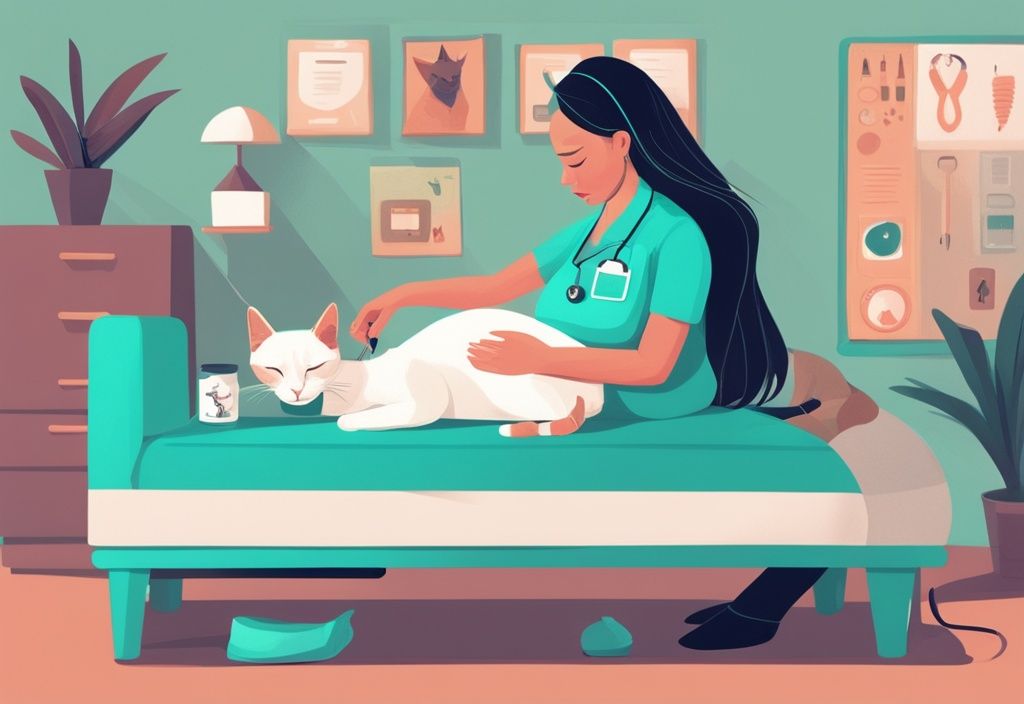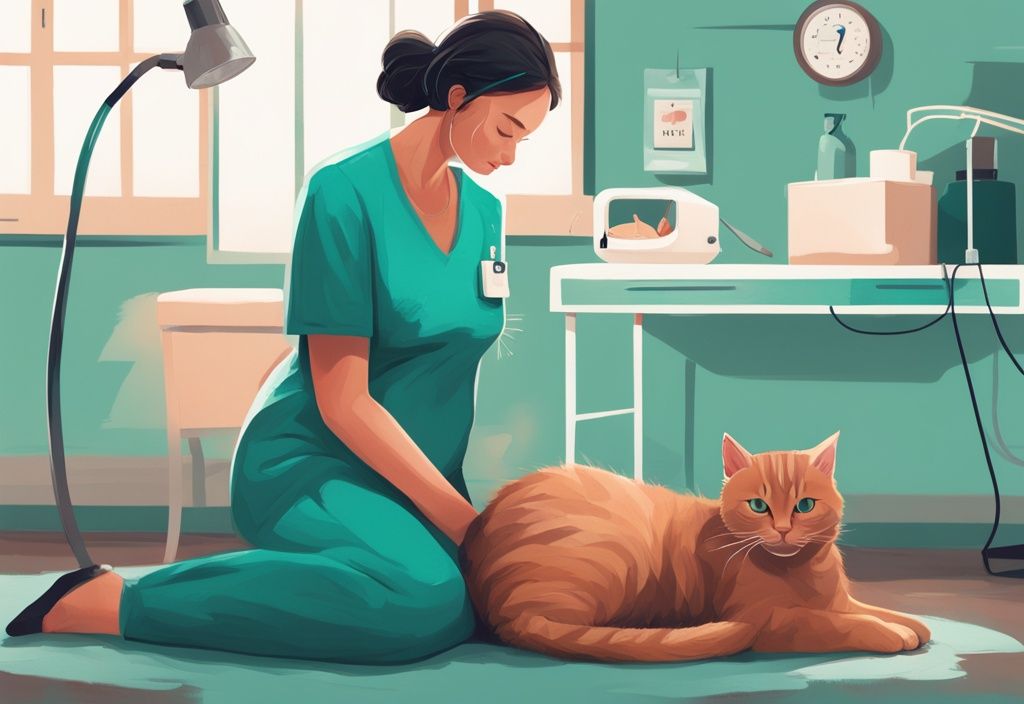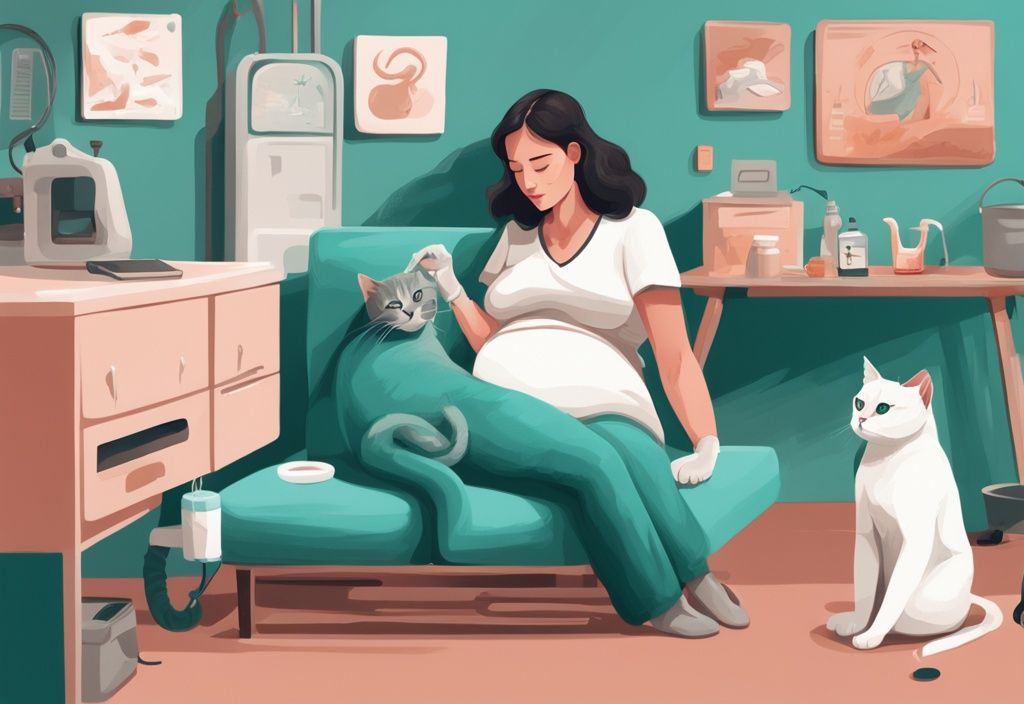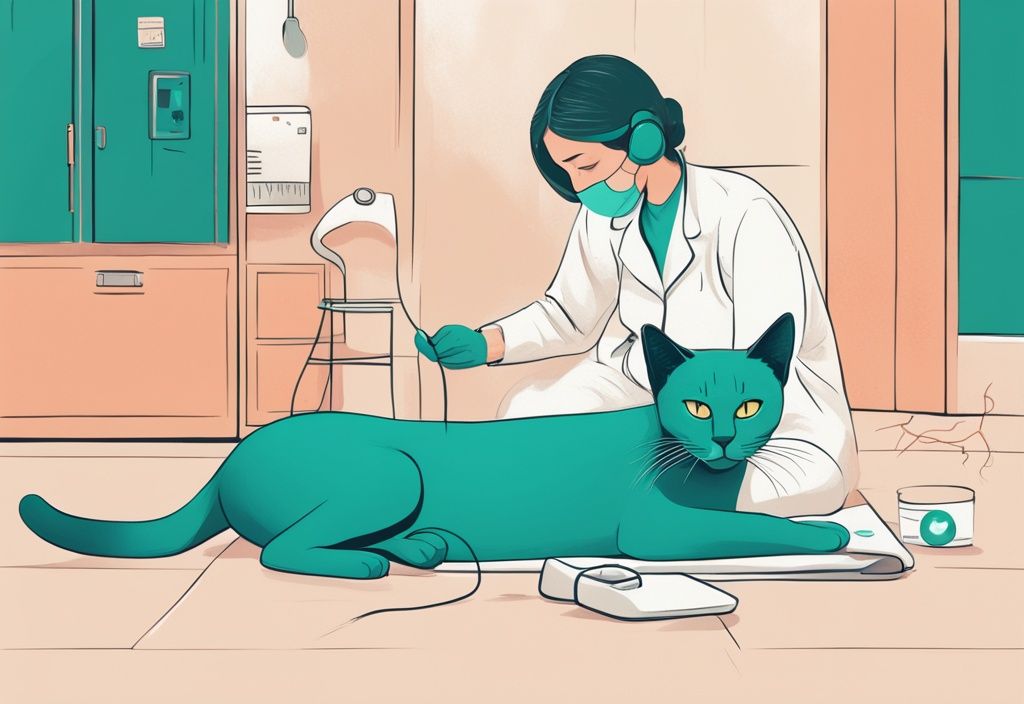Ever looked at your pregnant cat and wondered, “Is flea treatment safe for her?” As a fellow pet lover, I’ve been there too! Fleas are more than just pesky pests; they can cause serious health issues like anemia, especially in unborn kittens. But don’t fret, I’m here to guide you through the safest options.
In this article, we’ll explore effective ways to protect your feline friend and her future litter from these tiny troublemakers. We’ll also emphasize the importance of consulting a vet before making any decisions. After all, every cat is unique, just like Whiskers, my own rescue cat, who has her own special quirks and needs.
So, let’s dive in and ensure your cat’s pregnancy is as healthy and stress-free as possible. After all, isn’t that what we all want for our furry friends?
Is Flea Treatment Safe for Pregnant Cats?
When it comes to flea treatment for pregnant cats, ensuring safety is absolutely crucial. After all, we’re talking about the well-being of both the mama cat and her tiny, soon-to-arrive kittens. Regular flea control isn’t just a good idea—it’s essential. Imagine fleas as tiny vampires, potentially causing anemia, which is especially dangerous for those little furballs, especially in small kittens, as a heavy infestation can lead to severe health issues. For more information on flea-associated illnesses in cats, check out this resource on flea-associated illnesses. And yes, fleas love to hitch a ride from mom to her babies, so keeping them at bay is a must.
Spot-On Treatments: Are They Safe?
Spot-on treatments are like the superheroes of flea control for pregnant and nursing cats. You simply apply them directly to the cat’s skin, and voilà, fleas meet their match. These treatments often contain ingredients like Fipronil and (S) Methoprene, which are great at targeting fleas at every life stage, all while being safe for your furry friend. It’s like having a protective shield without any risk to the kittens.
Oral Treatments: A Good Choice?
Oral treatments can be a bit of a mixed bag. Some are safe for pregnant cats, working their magic by eliminating fleas once they bite. But, and it’s a big but, some tablets might contain ingredients that aren’t kitten-friendly. So, what’s a concerned pet parent to do? Consult your vet, of course! They’ll help you pick the safest option for your expecting feline.
Flea Collars: Yes or No?
Flea collars and pregnant cats? Typically, not the best combo. Many collars have ingredients that could be harmful. Sure, some might be deemed safe, but why take a chance? A quick chat with your vet can point you towards safer alternatives that’ll keep both mom and her kittens protected.
Flea Shampoos and Powders: The Pros and Cons
Flea shampoos and powders might seem like a good idea, but for pregnant cats, they’re usually a no-go. The risk of ingestion and potential harm to unborn kittens makes these options less appealing. Instead, explore alternatives that manage flea infestations without compromising health. Your vet can guide you to the safest choices.
Natural Flea Treatments: A Safer Alternative?
Natural flea treatments, often featuring essential oils, sound like a dream, right? They can be safer for pregnant cats, but not all are effective, and some might even be harmful. So, what’s the best move? You guessed it—consult your vet to find a natural treatment that’s both safe and effective for your pregnant kitty.
The Importance of Flea Treatment for Pregnant Cats
Ever wondered if flea treatment is safe for pregnant cats? Well, let me tell you, it’s a crucial part of keeping our feline friends happy and healthy. Imagine fleas as those uninvited guests who just won’t leave, and trust me, they can cause quite the ruckus! Regular flea treatment is like your cat’s personal bouncer, keeping those pesky critters at bay and ensuring a smooth ride for both the mama cat and her soon-to-arrive kittens.
Fleas have this sneaky way of hopping from the mother to her little ones, and the consequences can be pretty serious. Anemia, for instance, is one of those nasty side effects that can hit kittens hard, leading to severe health issues or, in the worst-case scenario, something much more heartbreaking.
So, what’s the game plan? Continuous protection with safe flea treatments is the name of the game. Pregnant cats need that extra bit of TLC to ensure they’re in tip-top shape, along with their unborn furballs. By sticking to a flea treatment routine, you’re not just protecting the momma cat; you’re setting the stage for her kittens to grow up in a safe, loving environment.
Of course, it’s always wise to have a chat with your vet. They’ll help you pick out the safest flea treatment options for pregnant cats, ensuring that you’re covering all your bases without putting anyone’s health at risk. After all, a happy cat means a happy home, right?

Safe Flea Treatments for Pregnant Cats
Finding the right flea treatment for your pregnant cat can feel like navigating a maze. With so many options out there, it’s crucial to choose one that keeps both the mama cat and her kittens safe. Let’s explore some options and see which ones are best suited for your furry family.
Spot-On Treatments: Are They Safe?
Spot-on treatments are like the superheroes of flea control for pregnant cats. You apply them directly to the skin, and they get to work faster than you can say “Whiskers!” The active ingredients, such as Fipronil and (S) Methoprene, are like tiny warriors, tackling fleas at every stage of their sneaky lifecycle. And the best part? They’re safe for both the mama and her little ones. No wonder they’re a top choice for many pet parents!
Oral Treatments: A Good Choice?
Oral treatments can be a bit of a mixed bag. While some are safe for pregnant cats, others might not be the best idea. These pills work by eliminating fleas once they bite, but some ingredients could pose risks to the developing kittens. So, it’s always a good idea to have a chat with your vet to find the safest option for your expecting feline friend.
Flea Collars: Yes or No?
Flea collars are a bit like that questionable fashion accessory you’re not quite sure about. For pregnant or nursing cats, they’re usually a no-go due to potentially harmful ingredients. But, if you’re considering one, make sure to get your vet’s opinion. They can steer you toward the safest alternatives, ensuring your cat and her kittens stay flea-free and fabulous.
Flea Shampoos and Powders: The Pros and Cons
When it comes to flea shampoos and powders, think twice before lathering up your pregnant kitty. The risk of ingestion is a big concern, which could spell trouble for those tiny kittens. These products might not be the safest flea treatment for pregnant cats, so exploring other options is often the way to go. After all, keeping both mom and her babies safe is the top priority!
Natural Flea Treatments: A Safer Alternative?
Natural flea treatments can sound like a dream come true, especially when they boast essential oils and other goodies. However, not all natural remedies are created equal. Some might be ineffective, while others could even be harmful. It’s essential to consult your vet to ensure the natural treatment you choose is both safe and effective. This way, you can make informed decisions that keep your cat and her kittens healthy and happy.
Ingredients to Look for in Flea Treatments for Pregnant Cats
When it comes to keeping your furry family member safe from pesky fleas during pregnancy, choosing the right ingredients is key. You want something that’s effective yet gentle enough for your soon-to-be momma cat. Let’s dive into some common ingredients and see what makes them tick!
Fipronil and (S) Methoprene: Are They Safe?
Ah, Fipronil and (S) Methoprene—a dynamic duo in the world of flea treatments. These ingredients are like the superhero team-up you never knew your pregnant cat needed! Found in many topical solutions, they work wonders by targeting fleas at every stage of their sneaky lifecycle. Imagine a tiny army taking down adult fleas and their eggs, ensuring your cat stays comfy and itch-free.
Now, you might be wondering, “But are these safe for my pregnant kitty?” The answer is a resounding yes! The safety of Fipronil and (S) Methoprene for pregnant cats is well-documented, so you can rest easy knowing that both mom and her future kittens are in good hands. It’s like giving her a protective shield without any of the drama!
Essential Oils in Flea Treatments: A Safe Option?
Essential oils—those fragrant wonders that promise a natural solution to many woes. But are they the right choice for your pregnant cat? Well, it depends. Some essential oils, like cedarwood and lemongrass, are generally considered safe and can help keep fleas at bay. Picture them as a gentle breeze that keeps those pesky bugs away.
However, not all essential oils are created equal. Some can be harmful to our feline friends, so it’s crucial to do a bit of homework. Before diving into the world of natural remedies, a chat with your vet is a must. This ensures your choice is safe and sound for your pregnant cat and her developing kittens. After all, we want to keep the focus on happy purrs and playful antics, right?

Why Consulting a Veterinarian is Crucial
Oh, the joys of pet parenthood! But when it comes to flea treatment for pregnant cats, things can get a tad tricky. That’s where the superhero in a white coat—your veterinarian—comes into play. Consulting a vet is like having a GPS for navigating the maze of flea treatments, ensuring your pregnant feline friend stays safe and sound. After all, not every flea treatment is a one-size-fits-all, especially when tiny paws are on the way!
Imagine this: You’re sipping your morning coffee while your cat, Whiskers, is lounging in a sunbeam. Suddenly, you spot a flea! Panic sets in, but fear not—your vet is just a call away. They offer personalized advice, considering your cat’s unique needs and health status. It’s like having a tailor-made suit, but for flea treatment! This ensures minimal stress and exposure, making the process as gentle as a lullaby. And let’s be honest, who wouldn’t want their cat to feel like royalty?
Plus, having a vet in your corner gives you that warm, fuzzy feeling of peace of mind. You can tackle those pesky fleas without worrying about harming the mama-to-be or her future kittens. It’s like having a safety net for your feline family during this special time. So, by teaming up with your vet, you’re not just treating fleas—you’re creating a safe, cozy haven for your furry family. And isn’t that what every pet parent dreams of?
Preventing Fleas During Your Cat’s Pregnancy
Ensuring the safety and comfort of your pregnant cat involves a bit of detective work, especially when it comes to pesky fleas. From grooming techniques to maintaining a clean home, let’s dive into some effective strategies that will help keep your feline friend flea-free and happy throughout her pregnancy.
Effective Grooming and Flea Combing Techniques
Ah, the joys of grooming! It’s not just about keeping your cat looking fabulous; it’s a vital flea-fighting tool, too. Regular grooming and flea combing are gentle yet effective ways to manage flea infestations in pregnant cats. Picture this: you, a fine-toothed flea comb, and your cat’s luxurious fur. It’s a bonding moment that also captures fleas and their eggs. This method can work wonders alongside any vet-approved flea treatments, ensuring your cat stays healthy and serene during her pregnancy. Keep an eye out for any signs of irritation or discomfort while grooming, as these might be clues that a flea issue needs your attention.
Keeping Your Home Flea-Free: Focus on Bedding and Rugs
Creating a flea-free haven at home is crucial for the well-being of both the expectant mother and her kittens. Bedding and rugs? They’re like flea magnets! Regular vacuuming of carpets and rugs can significantly cut down the risk of flea infestations by whisking away eggs and larvae before they mature. And don’t forget the power of hot water—washing your cat’s bedding can evict any unwelcome flea guests. By keeping these areas spick and span, you provide a cozy, safe environment for your pregnant cat.
How Regular Monitoring Can Help
Keeping a watchful eye on your pregnant cat and her surroundings is key to nipping flea infestations in the bud. Spotting signs like excessive scratching or those pesky little flea dirt specks early on allows you to spring into action. Did you know fleas can cause anemia, which is especially dangerous for kittens? If you’re curious about cat behavior, you might also wonder why your cat jumps on your back. Regular observation helps ensure both mama and her babies stay safe and sound throughout the pregnancy. If you see any signs of fleas, don’t hesitate to consult your veterinarian for the safest and most effective treatment options.
Managing Fleas After Your Cat Gives Birth
Welcoming a litter of kittens into your home is like throwing a tiny, adorable party! But amidst the cuteness, there’s a sneaky little guest you definitely don’t want—fleas. These pesky critters can cause serious trouble, especially for newborn kittens. So, how do you keep your furry family safe and sound? Let’s dive into some purr-fect strategies!
How to Check Your Kittens for Fleas
Once your cat has given birth, it becomes crucial to regularly inspect the newborn kittens for fleas. Fleas can pose a significant health risk to these vulnerable little creatures, potentially leading to conditions like anemia. Early detection is key to preventing these issues.
Gently part the fur and look for signs of fleas or flea dirt, which resembles tiny black specks. Pay special attention to areas like the neck, belly, and tail base. If you notice any signs of fleas, it’s essential to take immediate action to protect the kittens’ health.
Safe Flea Treatments for Newborn Kittens
When considering flea treatments for newborn kittens, it’s important to understand that many products are not safe for such young animals.
Consulting a veterinarian is crucial to determine the appropriate treatment options. A vet may suggest specific application methods that minimize exposure and stress for the kittens.
It’s vital to follow professional guidance to ensure the safety and well-being of the kittens while effectively managing any flea infestations. For those curious about pet behavior, you might wonder why your dog chews his bone on you and how it relates to their comfort and habits. Always prioritize treatments that are specifically labeled as safe for young kittens to avoid any potential harm.

Conclusion
Ah, the joys of pet parenting! If you’re anything like me, your furry companions are family, and ensuring their health is top priority. When it comes to our feline friends, especially those expecting little bundles of joy, the question “is flea treatment safe for pregnant cats” might pop up more often than you’d think. It’s a valid concern, and one that deserves a thoughtful approach.
Choosing the right flea treatment is like picking the perfect pair of shoes—not just any will do! You want something specifically labeled as safe for pregnant cats. This way, you’re not just protecting the mama cat, but also her soon-to-arrive kittens from pesky flea infestations. It’s a win-win!
Now, I know what you’re thinking: “But how do I know which product to choose?” That’s where your friendly neighborhood vet comes in. Consulting a veterinarian is like having a wise friend who knows all the best-kept secrets. They can guide you to the safest flea treatments, ensuring peace of mind during this special time. Because let’s face it, nobody wants to play a guessing game with their pet’s health, right?
And here’s a little tip from my own experience with Whiskers: keeping your home clean is just as important. Regularly vacuuming and washing your cat’s favorite hangout spots can do wonders in keeping those pesky fleas at bay. Think of it as a spa day for your home!
So, to wrap it all up, addressing “is flea treatment safe for pregnant cats” is a delightful mix of choosing the right products, seeking expert advice, and maintaining a clean, flea-free environment. It’s like a recipe for a happy, healthy feline family. And trust me, when you see those kittens scampering around, you’ll know it was all worth it!
Frequently Asked Questions
Can I Use Any Flea Treatment on My Pregnant Cat?
- Oh, the joys of expecting kittens! But wait, can you just grab any flea treatment off the shelf for your pregnant cat? Not so fast! Not all flea treatments are safe for those mama cats-to-be. It’s like picking the right baby shampoo—always go for products that are clearly labeled as safe during pregnancy. And remember, a quick chat with your vet can save you a lot of worry, ensuring the flea treatment is both safe and effective for your fluffy momma.
Why Aren’t Flea Collars Recommended for Pregnant Cats?
- Flea collars might seem like the quick fix, but they often contain ingredients that could be harmful to pregnant cats and their unborn kittens. Think of it like avoiding certain foods during pregnancy—better safe than sorry! It’s crucial to consult a vet for safer alternatives that won’t pose risks to the mother or her developing kittens. After all, keeping things safe and sound is the name of the game!
How Can I Keep My Home Flea-Free During My Cat’s Pregnancy?
- Keeping a flea-free home during your cat’s pregnancy is like setting up a cozy, clean nursery. Regularly vacuuming, washing bedding, and using vet-approved environmental treatments are your best friends here. These steps help eliminate fleas and prevent infestations, ensuring a safe environment for your pregnant cat. Who knew cleaning could be so rewarding?
What Should I Do If My Kittens Have Fleas After Birth?
- If those adorable kittens end up with fleas after birth, it’s time to act fast! Contact your vet immediately for guidance on safe treatment options for newborn kittens. Early intervention is crucial to protect their health and prevent any severe flea-related issues. After all, those tiny furballs deserve the best start in life!
